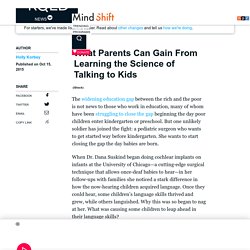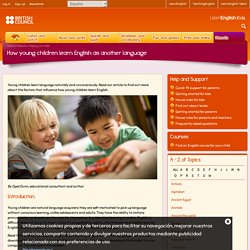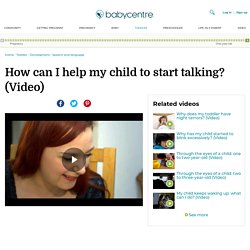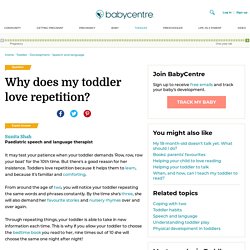

How can young children best learn languages? The British Council's Tracey Chapelton explains how parents of young children can lay the foundations for success. KQED Public Media for Northern CA. There was a direct correlation between the children who’d heard a lot of parent talk and how prepared they were to learn once they arrived at school.

Hart and Risley wrote, “With few exceptions, the more parents talked to their children, the faster the children’s vocabularies [grew] and the higher the children’s IQ test scores at age 3 and later.” For Suskind, a lightbulb went on. “The truth is, much of what you see in children born into poverty is analogous to children born deaf,” Suskind said. “It’s a really important point. The most fundamental science shows that it’s really language, and all that comes with it, the brain-building aspect of things, that makes a difference.” Bringing Parents On Board In Suskind’s new book, "Thirty Million Words," she explains the research behind the word gap in detail, along with her research-based initiative of the same name, aimed at boosting children’s brains in the first three years of their lives. . * Tune In. . * Talk More. . * Take Turns. Patricia Kuhl: The linguistic genius of babies.
Alison Gopnik: What do babies think? How young children learn English as another language. By Opal Dunn, educational consultant and author Introduction Young children are natural language acquirers; they are self-motivated to pick up language without conscious learning, unlike adolescents and adults.

They have the ability to imitate pronunciation and work out the rules for themselves. Any idea that learning to talk in English is difficult does not occur to them unless it’s suggested by adults, who themselves probably learned English academically at a later age through grammar-based text books. Read the notes below about young children learning English as another language. The advantages of beginning early.
Being Multilingual: You speak with an accent. I don’t. Accents are things that only other people have. They are, by extension, things that you don’t want to have. Accents are, in short, shortcomings. This is why, if someone tells you that “you speak with no accent”, you can be sure of two things: that you have received words of praise indeed; and that you speak with the same accent as that person. So the person is actually not only praising her own accent, she is also giving evidence that she has no idea she’s got one.
Multilingual Preschoolers. It’s amazing how young children learn to converse with others. They have to not only internalize grammar and vocabulary, but also develop an understanding of culture: how to take turns in a conversation, who to talk to, and how to narrate a story. For dual language learners (DLLs) — children under the age of 5 with a home language other than English — that process can be complex.
These young children must constantly navigate between two languages and cultures, while learning the rules of both. And while the benefits of multilingualism are clear, these learners they may be excluded or teased because of their differences, which can hinder their development. As linguistic diversity skyrockets worldwide, early childhood educators need to be prepared to help DLL students meet and overcome these unique challenges. The Diversity of Languages in Early Education. How can I help my child to start talking? (Video) Health visitor Sara Patience describes how you can help develop your child's language skills by talking and playing with her.

Show transcript Hide transcript How can I help my child to start talking? Sara: “You want this one? Between 12 months and two-and-a-half years, there is a lot of language development, and you will hear your child start to use more and more words. Why does my toddler love repetition? Paediatric speech and language therapist It may test your patience when your toddler demands 'Row, row, row your boat' for the 10th time.

But there's a good reason for her insistence. Toddlers love repetition because it helps them to learn, and because it's familiar and comforting. From around the age of two, you will notice your toddler repeating the same words and phrases constantly. By the time she's three, she will also demand her favourite stories and nursery rhymes over and over again. Through repeating things, your toddler is able to take in new information each time. And she will love stories and nursery rhymes with repeated phrases, because she can join in. A small study has found that repetition of stories may help children to learn new words. After hearing her favourite book many times, your toddler may even remember it well enough to add the endings to some of the sentences. Repetition is also comforting for your toddler. Listen to Your Mother. Deb Roy: The birth of a word.
FAQ: Raising Bilingual Children. Why want bilingual children? There are many reasons, but the two most common are: 1) The parents speak different languages (say, an American woman and a Turkish man). 2) The parents speak the same language, but live in a community where most people speak something else (say, a Korean couple living in the USA). In the first case, both the mother and father may want to be able to use their own language when talking to their children. This is the bilingual home situation. Don't children get confused when they hear two languages spoken around them? The short answer is no. Let's Talk. What do babies need in order to learn and thrive? One thing they need is conversation — responsive, back-and-forth communication with their parents and caregivers.
This interactive engagement is like food for their developing brains, nurturing language acquisition, early literacy, school readiness, and social and emotional well-being. A dispiriting number of children don’t get that kind of brain-fueling communication, research suggests. In early childhood policy (and in the wider media), much attention has been paid to the so-called word gap — findings that show that low-income children hear 30 million fewer words, on average, and have less than half the vocabulary of upper-income peers by age three. But putting that alarming number in the spotlight obscures a more critical component of the research, says Harvard Graduate School of Education literacy expert Meredith Rowe: it’s not so much the quantity of words but the quality of the talk that matters most to a child’s development.